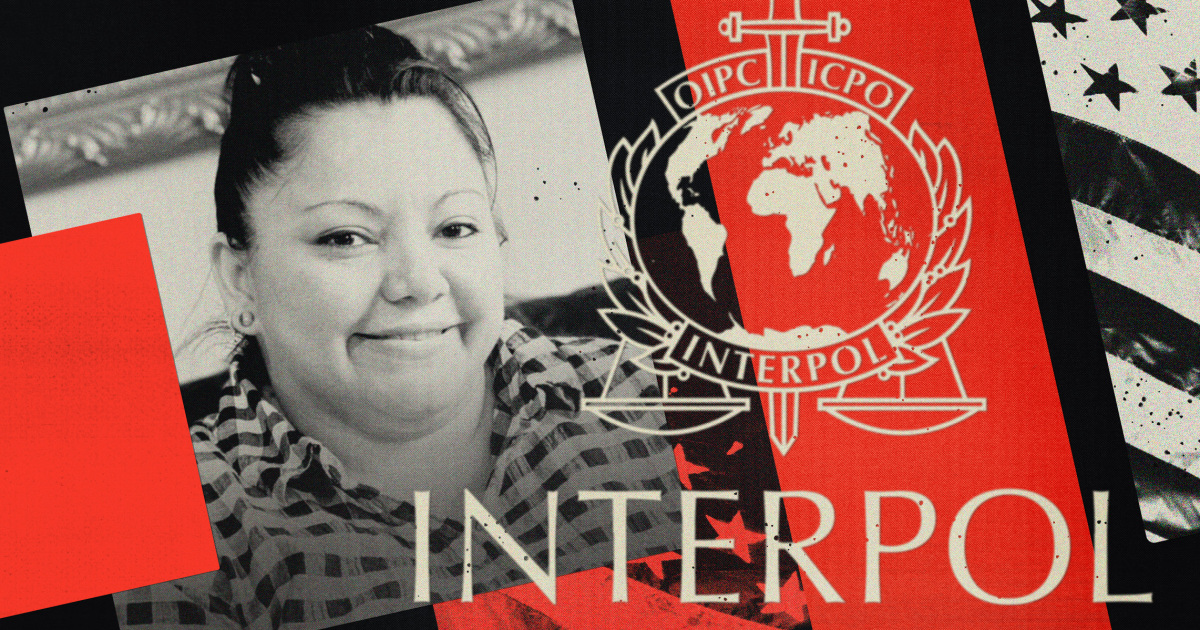Barahona-Martínez now hopes her case “reaches the eyes and ears of those working on immigration,” she told NBC News and Sky News in her first sit-down interview since her release. “It’s very painful to see, hear and to feel the injustice I went through and that many of us immigrants have to go through,” she said in her native Spanish.
Sandra Grossman, Barahona-Martínez’s attorney, said her firm has “been fighting bogus Red Notices” like the one placed against her client for more than 15 years, but Barahona-Martínez’s case is “one of the most egregious examples” she had ever seen.
While most Red Notices are legitimate, the harm that can come if one’s name should be off the list but falls through the cracks is often far too great, Grossman said.
Para leer en español, haga click aquí
Barahona-Martínez fled to the U.S. with her children in 2016 to seek asylum after the openly lesbian woman faced torture and death threats from gangs after being accused of belonging to a rival gang and extorting less than $30. She attributed the charge to a police officer who held a grudge over her sexual orientation and the fact she rebuffed his sexual advances.
Barahona-Martínez was acquitted the following year due to a lack of evidence, according to the ACLU and Grossman.
The LGBTQ population in El Salvador is known to face “torture, inhuman or degrading treatment, excessive use of force, illegal and arbitrary arrests and other forms of abuse, much of it committed by public security agents,” the Salvadoran government agency in charge of the national police force admitted in 2017.
ICE claims it arrested Barahona-Martínez in 2017 because it learned she “was wanted for extortion in El Salvador, identifying her as having a gang affiliation.” But in reality, it came across a Red Notice from Salvadoran authorities based on an arrest warrant for contempt of court, “not for the criminal offense of extortion,” Grossman said. “Basically, she didn’t show up for a hearing that she didn’t know about” following an attempt to reopen the case she was acquitted for.
Barahona-Martínez was denied bond following her 2017 ICE arrest based on the Red Notice, with the immigration judge hearing no testimony or evidence of its validity, triggering her lengthy detention, court records show.
She spent most of her detention in an ICE facility in Louisiana over a thousand miles away from her family in Virginia.
Whenever the pain of their separation became too heavy for Barahona-Martínez, she would find comfort in a Spanish-language book about building up emotional strength she had checked out from the facility’s library. She still finds solace in this book, which she kept following her release over three months ago.
The toll of her lengthy detention is evident as she gets reacquainted with her three children, Gloria Marroquín Barahona, 21, Marcos Marroquín Barahona, 20, and Jazmin Elena Marroquín Barahona, 19, in their Virginia home. Her children were between the ages of 12 and 15 when ICE arrested their mother six years ago.
“We basically grew up without her,” Marcos said. “On many birthdays we wished that she was here with us, and in many events that we had in life she wasn’t there, too. So that makes this a hard time for us.”
Barahona-Martínez didn’t just lose time with her children that she’ll never get back. She wasn’t with her sister Bertha as she was dying of cancer in 2022, one of the toughest parts of her detention.
“We had made a pact. She was going to fight for her life, and I was going to fight to be free,” Barahona-Martínez said, recalling one of the last conversations she had with Bertha. “Unfortunately, I had to watch her die, me behind bars.”

The irreparable damage of ‘bogus Red Notices’
Contrary to what many may think, Interpol is not a law enforcement agency. It mainly manages over a dozen databases with information on crimes and criminals for police forces worldwide to access. These include Red Notice alerts that Interpol publishes at the request of any of its 196 member countries.
Red Notices are not arrest warrants, but more like digital “wanted person” posters. Because Interpol doesn’t investigate the legal merits of the alerts, the system can be abused and misused by countries looking to persecute nationals who fled and are now residing abroad.
It’s particularly detrimental to innocent noncitizens legitimately seeking asylum in the U.S., because immigration officers and judges often consider the mere existence of the Red Notice to be conclusive evidence of criminality, even though it doesn’t in itself establish probable cause that a crime has been committed, according to at least one federal appeals court.
Interpol told NBC News in an email it takes “any alleged misuse of INTERPOL Red Notices extremely seriously” and has “significantly strengthened” a task force to review Red Notice requests to ensure compliance with its policies, as well as a commission to process requests and delete the ones without merit.
Interpol declined to comment on the specifics of Barahona-Martínez’s case, citing the organization’s policies.
Interpol is estimated to have rejected or deleted an average of 1,000 Red Notices and wanted person diffusions annually over the past five years, according to Interpol data analyzed by the U.K.-based nongovernmental organization Fair Trials. Just in 2021, approximately half of the removed notices were deleted on human rights grounds or because they were placed for political, military, religious or racial reasons.
Four immigrant rights and legal organizations in the U.S. recently cited at least four cases involving Salvadoran immigrants with Red Notices “based on false arrest warrants, baseless accusations, or other unsubstantiated evidence” in a letter sent to the Department of Homeland Security requesting an investigation into its reliance on police information from El Salvador.
DHS did not respond to a request for comment about the allegations made in the letter.
Barahona-Martínez won asylum twice while detained after an immigration judge found her testimonies consistent and credible in 2018 and 2019. But federal immigration authorities appealed both decisions based on the Red Notice, arguing it gave them probable cause to believe she had committed a crime, even without a conviction. The Board of Immigration Appeals sided with federal immigration authorities both times.
After that, the ACLU enlisted Grossman’s firm to help get Barahona-Martínez’s Red Notice deleted. It was removed in April 2023, just three weeks after Interpol received the request.
INTERPOL did not provide a reason behind the Red Notice deletion in Barahona-Martínez’s case as they normally don’t share that information.
It usually takes INTERPOL six months or more to remove a Red Notice, according to Fair Trials.
With the Red Notice gone, ICE couldn’t legally justify her detention, the ACLU argued in a Sept. 6 court filing. Barahona-Martínez was abruptly released three weeks later under an order of supervision, requiring her to wear an ankle monitor and routinely check in with ICE.
In a statement to NBC News, ICE wrote that it doesn’t comment on pending litigation, adding ICE officers “apply prosecutorial discretion in a responsible manner, informed by their experience as law enforcement professionals.”

As Barahona-Martínez adjusts to her new life, her release “was a moment of many mixed emotions.” While she was eager to reunite with her family, “an ugly fear gripped me. I realized I was afraid to be out again,” she said, as she held back tears.
While her children are mostly focusing on making up for lost time, they’re also grappling with fears of their own.
“I still feel scared that one day they could just bring everything again, have her going back to jail,” her son Marcos said. “I’m just trying to spend most of the time with her.”
Preventing more unjust Red Notices
Two days after Barahona-Martínez’s release, ICE updated its guidelines on how to handle Red Notices, including not treating them as arrest warrants and letting the wanted person know about the notice and giving them “a meaningful opportunity to contest it.”
While Grossman said it’s a promising step forward, she warned the guidance still lacks language requiring ICE to apply these new directives to existing cases — not just upcoming ones. While ICE did not directly answer whether the directive applies only to new cases, it stated, “At no time — as a matter of law — has ICE been able to arrest someone based solely on information stemming from an Interpol Red Notice.”
While ICE insists it doesn’t arrest people based on Red Notices, Grossman disputed the statement.
“In our experience, the way that ICE uses Red Notices is to target noncitizens,” the attorney said. “ICE has very broad discretionary authority to arrest a noncitizen in the U.S., and I think that when they receive information that an individual has a Red Notice, it’s treated in large part as conclusive evidence of criminality.”
Court documents show immigration authorities argued in immigration court that ICE arrested Barahona-Martínez in 2017 because she was the subject of an Interpol Red Notice.
“There is no reason that an individual with Jessica’s background, with the compelling equities in her case, should have been in ICE detention for six years,” Grossman said.
“There are so many cases like Jessica’s,” the attorney added, stressing that Barahona-Martínez could still be deported back to El Salvador based on the arrest warrant for contempt of court — and risk facing the dangers she escaped.
In 2021, Congress passed the Transnational Repression Accountability and Prevention Act, stopping U.S. government agencies from extraditing anyone based solely on an Interpol notice. It also requires the State Department to issue reports to Congress on countries that abuse Interpol for political motives and other unlawful purposes.
A spokeswoman for TRAP Act co-sponsor Sen. Marco Rubio, R-Fla., told NBC News in a statement he believes the State Department has enhanced its efforts to support reform at Interpol to ensure “dictators cannot issue arrest warrants for their political opponents with impunity,” but admitted that “more work is needed.”
As Barahona-Martínez shared her experience after her name appeared on a Red Notice list, she warned, “There are many people like me who are being unfairly detained.”
For more from NBC Latino, sign up for our weekly newsletter.


